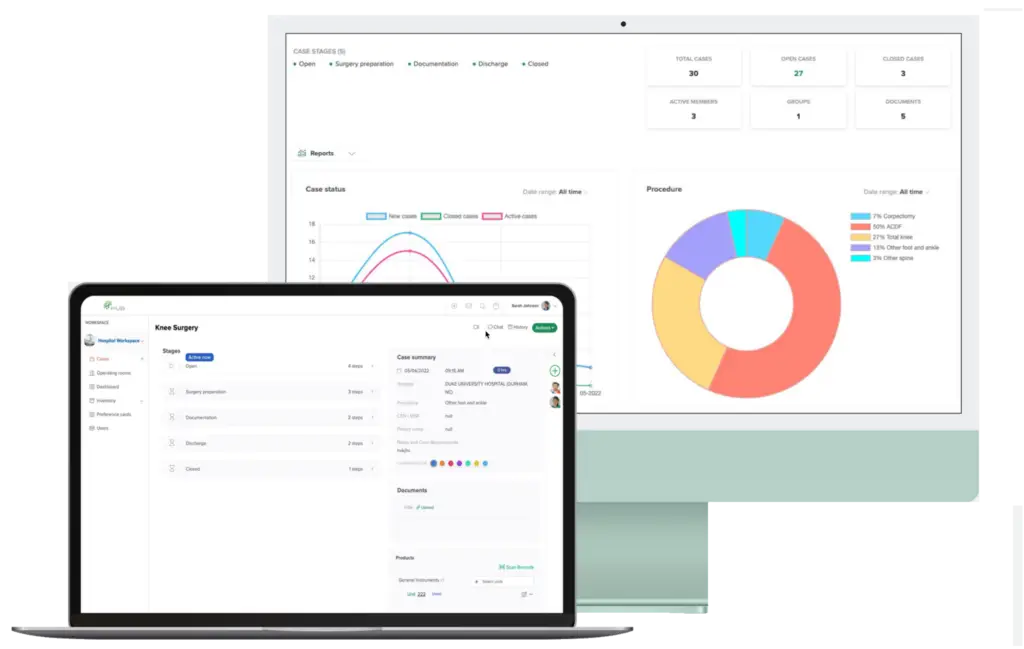How Surgical Teams Use HUB Healthcare to Prevent Preoperative Challenges
Preoperative challenges can be a significant source of stress for surgical teams and patients alike. Issues that arise before the case even begins can lead to delays, complications, and increased costs. However, surgical teams are finding innovative solutions to mitigate these challenges, and HUB Healthcare is at the forefront of this transformation.
In this article, we will explore how surgical teams are leveraging the power of HUB Healthcare to identify and address preoperative issues, ultimately leading to smoother, more efficient surgeries and improved patient outcomes.

Identifying Preoperative Challenges
Before a surgical procedure, there are numerous factors that need to align perfectly for a successful outcome. These may include:
Patient Preparation: Ensuring that the patient is adequately prepared for surgery, which may involve fasting, medication management, and other preoperative protocols.
Equipment and Supplies: Confirming that all necessary equipment and supplies are available, sterilized, and in good working order.
Surgical Team Coordination: Coordinating the schedules and roles of various team members, including surgeons, nurses, anesthesiologists, and support staff.
Patient Information: Accessing and reviewing the patient’s medical history, allergies, and any other relevant information.
Operating Room Availability: Ensuring that the operating room is ready and available at the scheduled time.
Failure to address any of these factors adequately can lead to delays, surgical site infections, anesthesia complications, and other adverse events. Surgical teams understand the importance of a well-coordinated, error-free preoperative process.
How HUB Healthcare Helps
HUB Healthcare is a comprehensive healthcare communication and collaboration platform that offers a centralized hub for surgical teams to streamline their preoperative processes. Here’s how it works:
Patient Data Integration: HUB Healthcare integrates with electronic health records (EHR) systems, allowing surgical teams to access patient information seamlessly. This ensures that all team members have real-time access to critical patient data, reducing the risk of errors and improving patient safety.
Scheduling and Coordination: The platform offers advanced scheduling and coordination features, allowing surgical teams to synchronize their schedules, assign roles, and communicate efficiently. Notifications and alerts help keep everyone on track.
Inventory Management: HUB Healthcare includes inventory management capabilities, ensuring that all necessary equipment and supplies are available and properly maintained. This minimizes the risk of last-minute shortages or equipment failures.
Real-Time Communication: Surgical teams can communicate in real time through secure messaging, audio, and video calls. This facilitates quick decision-making and issue resolution, even if team members are in different locations.
Checklists and Protocols: HUB Healthcare enables the creation and management of preoperative checklists and protocols. Teams can ensure that all necessary steps are followed, reducing the likelihood of oversights.
Real-World Benefits
The implementation of HUB Healthcare has yielded tangible benefits for surgical teams:
Reduced Delays: By streamlining preoperative processes and improving communication, surgical teams can significantly reduce delays and ensure that cases start on time.
Enhanced Patient Safety: Access to comprehensive patient data and real-time communication means that teams can provide safer and more personalized care.
Cost Savings: Fewer delays, complications, and cancellations result in cost savings for healthcare facilities.
Improved Team Collaboration: HUB Healthcare fosters better collaboration among surgical team members, leading to smoother procedures and improved job satisfaction.
Conclusion
Preoperative challenges are a common concern for surgical teams, but they are no longer insurmountable obstacles. With HUB Healthcare, these teams have found a powerful ally in their quest to reduce issues before the case even starts. Through seamless communication, real-time data access, and streamlined coordination, surgical teams can ensure that their patients receive the highest quality care from the moment they enter the operating room.
HUB Healthcare is not just a platform; it’s a vital tool that empowers surgical teams to enhance patient safety, minimize delays, and deliver excellence in surgical care. As the healthcare industry continues to evolve, HUB Healthcare remains at the forefront, helping surgical teams meet the challenges of today and tomorrow.

What Is HUB Healthcare?
HUB Healthcare offers a comprehensive solution designed to enhance communication in healthcare, streamline care coordination, and improve overall workflow efficiency. Our platform includes features such as medical case management software, healthcare document management, and healthcare analytics to ensure that all aspects of patient care are optimized. By leveraging HUB Healthcare’s robust tools, organizations can reduce workflow bottlenecks, automate repetitive tasks, and facilitate better collaboration among healthcare providers. This not only improves work quality but also enhances patient outcomes, making HUB Healthcare an essential partner in achieving healthcare excellence.
Visit our Help Center – Here





